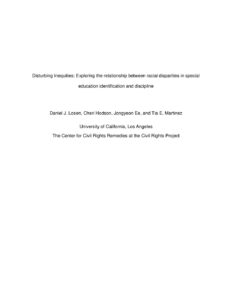Abstract
This study is based upon a longitudinal analysis of data for a cohort of 181,897 Florida state students who were first time 9th graders in the 2000-01 school year and follows them trough to high school and post-secondary outcomes. Analysis of 9th grade suspension data finds that black students, students who are economically disadvantaged, and special education students are three demographics subgroups that are disproportionately suspended, both in the frequency of suspensions and the duration in number of school days lost. While poverty and ethnicity are themselves highly correlated, poverty alone does not explain the disproportionate suspension rates amongst black students. Further analyses show that out-of-school suspensions in the 9th grade year are also significantly and negatively correlated to later high school graduation as well as post-secondary enrollment and persistence. Thus demographic disparities in disciplinary incidents serve to further widen any academic achievement gaps. Closer analysis though shows though that disciplinary incidents are interrelated with other of indicators of student disengagement from school, such as course failures and absenteeism. Therefore, policies seeking to address these issues cannot focus on reducing suspensions alone, but must also address student attendance and course passing in a comprehensive and systematic manner.
In compliance with the UC Open Access Policy, this report has been made available on eScholarship:
